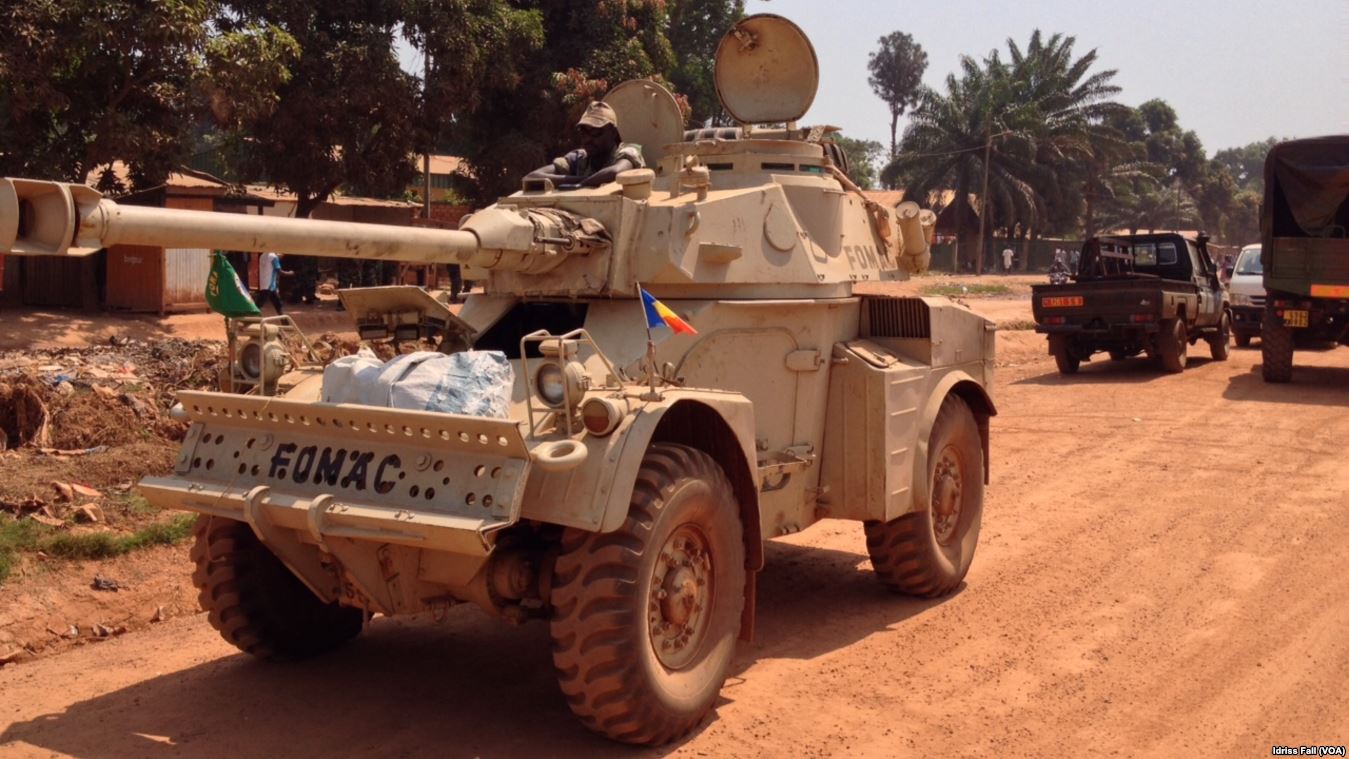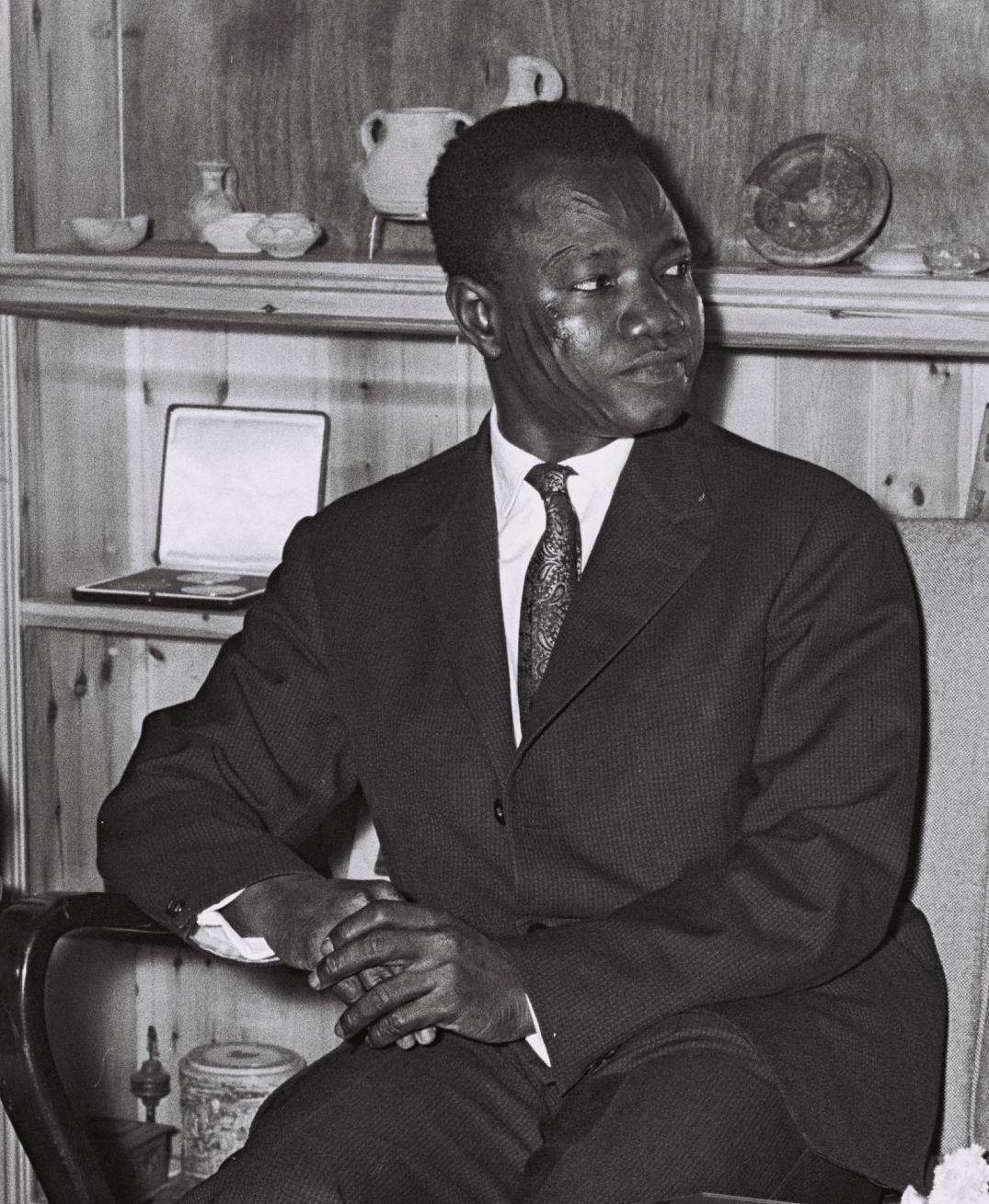|
National Union For Independence And Revolution
The National Union for Independence and Revolution (french: Union Nationale pour l'indépendance et la révolution, UNIR) was the ruling party in Chad between 1984 and 1990. It was founded in June 1984 by President Hissène Habré as a successor of his Armed Forces of the North, the insurgent group through which Habré had conquered power in 1982. The party was banned six years later by Idriss Déby when he assumed power by overthrowing Habré in the 1990 coup d'état. Background In 1965 Chad had was plunged in civil war, in a rebellion representing a rekindling of traditional animosities between the Muslim northern and central regions and the predominantly non-Muslim people of the south who had dominated the government and civil service since independence. A turning point in the conflict was represented by the conquest in 1979 of the capital, N'Djamena, by northern insurgents; although the struggle continued with increasing severity, its shape now changed, developing in a confli ... [...More Info...] [...Related Items...] OR: [Wikipedia] [Google] [Baidu] |
Hissène Habré
Hissène Habré (Arabic: ''Ḥusaīn Ḥabrī'', Chadian Arabic: ; ; 13 August 1942 – 24 August 2021), also spelled Hissen Habré, was a Chadian politician and convicted war criminal who served as the 5th president of Chad from 1982 until he was deposed in 1990. A member of Chad's northern population, Habré joined FROLINAT rebels in the first Chadian Civil War against the southern-dominated Chadian government. Due to a rift with fellow rebel commander Goukouni Oueddei, Habré and his Armed Forces of the North rebel army briefly defected to Felix Malloum's government against Oueddei before turning against Malloum, who resigned in 1979. Habré was then given the position of Minister of Defense under Chad's new transitional coalition government, with Oueddei as President. Their alliance quickly collapsed, and Habré's forces overthrew Oueddei in 1982. Having become the country's new president, Habré created a one-party dictatorship ruled by his National Union for Inde ... [...More Info...] [...Related Items...] OR: [Wikipedia] [Google] [Baidu] |
Transitional Government Of National Union
The Transitional Government of National Unity (''Gouvernement d'Union Nationale de Transition'' or GUNT) was the coalition government of armed groups that nominally ruled Chad from 1979 to 1982, during the most chaotic phase of the long-running civil war that began in 1965. The GUNT replaced the fragile alliance led by Félix Malloum and Hissène Habré, which collapsed in February 1979. GUNT was characterized by intense rivalries that led to armed confrontations and Libyan intervention in 1980. Libya intervened in support of the GUNT's President Goukouni Oueddei, against the former GUNT Defence Minister Hissène Habré. Because of international pressures and uneasy relations between Goukouni and Libyan leader Muammar al-Gaddafi, Goukouni asked the Libyans to leave Chad in November 1981; they were replaced by an Inter-African Force (IAF). The IAF showed itself unwilling to confront Habré's militia, and on June 7, 1982, the GUNT was ousted by Habré; Goukouni fled into exile. T ... [...More Info...] [...Related Items...] OR: [Wikipedia] [Google] [Baidu] |
Djidingar Dono Ngardoum
Djidingar Dono Ngardoum (1928 – February 19, 2000) was Prime Minister of Chad from May 19, 1982 to June 19, 1982. He was minister of finance A finance minister is an executive or cabinet position in charge of one or more of government finances, economic policy and financial regulation. A finance minister's portfolio has a large variety of names around the world, such as "treasury", " ... until 1965. References 1928 births 2000 deaths Heads of government of Chad Finance ministers of Chad {{Chad-politician-stub ... [...More Info...] [...Related Items...] OR: [Wikipedia] [Google] [Baidu] |
National Rally For Development And Progress
The National Rally for Development and Progress (french: Rassemblement national pour le développement et le progrès, also known as VIVA) is a political party in Chad, led by Delwa Kassiré Koumakoye. It was founded in early 1992, with Koumakoye as its president. In the parliamentary election A general election is a political voting election where generally all or most members of a given political body are chosen. These are usually held for a nation, state, or territory's primary legislative body, and are different from by-elections ( ... held on 21 April 2002, the party won five out of 155 seats; all five of these were in Kélo constituency in Tandjilé Ouest Department, where the party won all of the available seats. In the May 2006 presidential election, its candidate, Koumakoye, won 15.13% of the vote.Valery Gottingar"Scrutin présidentiel du 03 mai 2006: le Conseil Constitutionnel proclame le Président Idriss Deby Itno réélu au premier tour avec un score de 64,67%." ... [...More Info...] [...Related Items...] OR: [Wikipedia] [Google] [Baidu] |
Delwa Kassiré Koumakoye
Nouradine Delwa Kassiré Koumakoye ( ar, نور الدين دلوا كوماكوي; born December 31, 1949"Le Premier Ministre du Tchad: un homme averti de la politique tchadienne" Chadian government website, March 16, 2007 .) is a Chadian politician and the head of the (VIVA-RNDP) political party. [...More Info...] [...Related Items...] OR: [Wikipedia] [Google] [Baidu] |
Frolinat Originel
FROLINAT (french: Front de libération nationale du Tchad; en, National Liberation Front of Chad) was an insurgent rebel group active in Chad between 1966 and 1993. Origins The organization was a result of the political union between the leftist Chadian National Union (UNT), led by Ibrahim Abatcha, and the General Union of the Sons of Chad (''Union Générale des Fils du Tchad'' or UGFT), led by Ahmed Hassan Musa. An Islamist, Musa was close to the Muslim Brotherhood. The UGFT remained autonomous within the new group under the banner of the Liberation Front of Chad (FLT). The union and group flag was agreed upon at the Nyala Congress in Sudan between June 19 and June 22, 1966. Abatcha was proclaimed Secretary-general, while another cadre of the UNT, Abou Bakar Djalabou, was designated to lead the delegation that would represent the movement abroad. A committee was also selected at the congress, composed of thirty members taken equally from the UNT and the FLT. The front was c ... [...More Info...] [...Related Items...] OR: [Wikipedia] [Google] [Baidu] |
Abba Siddick
Abba Siddick (25 December 1924 – 1 December 2017) was a Muslim Chadian politician and revolutionary born in what was the Oubangui-Chari French colony (today Central African Republic). In passing in Chad (also a French colony then), he entered in active politics in the Chadian Progressive Party (PPT), a nationalist and radical African political party founded in 1947 and led by Gabriel Lisette. By 1958, he had left the PPT to form with others the Chadian National Union (UNT), a Muslim progressive party, but he turned quite early to the PPT and, after the independence of Chad, was minister of Education of the President François Tombalbaye. However the President's discrimination against Muslims in Chad brought him to become a member of the rebel insurgent group FROLINAT, formed in 1966 to oppose the rule of Tombalbaye. After the death of the organization's first secretary-general in 1968, a vicious battle for leadership ensued, which terminated with the victory of Siddick in 1969, ev ... [...More Info...] [...Related Items...] OR: [Wikipedia] [Google] [Baidu] |
Party Congress
The terms party conference (UK English), political convention ( US and Canadian English), and party congress usually refer to a general meeting of a political party. The conference is attended by certain delegates who represent the party membership. In most political parties, the party conference is the highest decision-making body of the organization, tasked with electing or nominating the party's leaders or leadership bodies, deciding party policy, and setting the party's platform and agendas. The definitions of all of these terms vary greatly, depending on the country and situation in which they are used. The term ''conference'' or ''caucus'' may also refer to the organization of all party members as a whole. The term ''political convention'' may also refer to international bilateral or multilateral meetings on state-level, like the convention of the Anglo-Russian Entente (1907). Leadership roles Within party conferences, there might be different offices or bodies fulfill ... [...More Info...] [...Related Items...] OR: [Wikipedia] [Google] [Baidu] |
Military Of Chad
french: Armée nationale tchadienne , image = , alt = , caption = , image2 = , alt2 = , caption2 = , motto = , founded = 1969 , current_form = , disbanded = , branches = , headquarters = N'Djamena , flying_hours = , website = , commander-in-chief = Corps General Mahamat Déby Itno , commander-in-chief_title = Commander-in-Chief , chief minister = , chief minister_title = , minister = Bichara Issa Djadallah , minister_title = Minister of Defence , commander = Azem Bermendoa Agouna , commander_title = Chief of the General Staff , age = 18 years of age , conscription = Yes , manpower_data = , manpower_a ... [...More Info...] [...Related Items...] OR: [Wikipedia] [Google] [Baidu] |
François Tombalbaye
François Tombalbaye ( ar, فرنسوا تومبالباي '; 15 June 1918 – 13 April 1975), also known as N'Garta Tombalbaye, was a Chadian politician who served as the first President of Chad from the country's independence in 1960 until his overthrow in 1975. A dictatorial leader, his divisive policies as president led to factional conflict and a pattern of authoritarian leadership and political instability that are still relevant in Chad today. A native of the south of the country, Tombalbaye began his career as a teacher during French colonial rule and joined the Chadian Progressive Party (PPT) in 1946. After serving in the colonial legislature in the 1950s, he succeeded Gabriel Lisette as the PPT's leader in 1959 and was appointed the country's first president upon gaining independence in 1960. In 1962, he declared the PPT the sole legal party and presided over a corrupt dictatorship characterized by extreme favoritism to his southern-based patronage network. He al ... [...More Info...] [...Related Items...] OR: [Wikipedia] [Google] [Baidu] |
Prefect
Prefect (from the Latin ''praefectus'', substantive adjectival form of ''praeficere'': "put in front", meaning in charge) is a magisterial title of varying definition, but essentially refers to the leader of an administrative area. A prefect's office, department, or area of control is called a prefecture, but in various post-Roman empire cases there is a prefect without a prefecture or ''vice versa''. The words "prefect" and "prefecture" are also used, more or less conventionally, to render analogous words in other languages, especially Romance languages. Ancient Rome ''Praefectus'' was the formal title of many, fairly low to high-ranking officials in ancient Rome, whose authority was not embodied in their person (as it was with elected Magistrates) but conferred by delegation from a higher authority. They did have some authority in their prefecture such as controlling prisons and in civil administration. Feudal times Especially in Medieval Latin, ''præfectus'' was used to r ... [...More Info...] [...Related Items...] OR: [Wikipedia] [Google] [Baidu] |
Libya
Libya (; ar, ليبيا, Lībiyā), officially the State of Libya ( ar, دولة ليبيا, Dawlat Lībiyā), is a country in the Maghreb region in North Africa. It is bordered by the Mediterranean Sea to the north, Egypt to Egypt–Libya border, the east, Sudan to Libya–Sudan border, the southeast, Chad to Chad–Libya border, the south, Niger to Libya–Niger border, the southwest, Algeria to Algeria–Libya border, the west, and Tunisia to Libya–Tunisia border, the northwest. Libya is made of three historical regions: Tripolitania, Fezzan, and Cyrenaica. With an area of almost 700,000 square miles (1.8 million km2), it is the fourth-largest country in Africa and the Arab world, and the List of countries and outlying territories by total area, 16th-largest in the world. Libya has the List of countries by proven oil reserves, 10th-largest proven oil reserves in the world. The largest city and capital, Tripoli, Libya, Tripoli, is located in western Libya and contains over ... [...More Info...] [...Related Items...] OR: [Wikipedia] [Google] [Baidu] |




